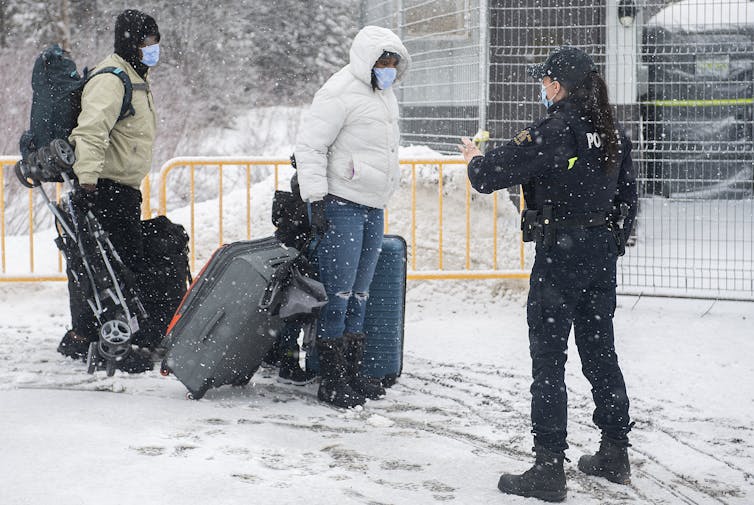
The recent announcement to amend the Canada-United States Safe Third Country Agreement has drawn criticism from human rights groups, refugee advocates, lawyers, researchers and the federal NDP.
Unless the Supreme Court of Canada rules the original agreement is unconstitutional, the new deal on refugee claimants is likely to stand. Justin Trudeau’s government has invested significant political and diplomatic capital in negotiating the amendment.
It was agreed in principle almost a year ago, but implementation had stagnated. As late as the end of February 2023, David Cohen, the U.S. ambassador to Canada, hinted that no change to the agreement was likely.
Radio Canada has reported the last-minute change of heart by Americans was due to an increase in irregular migration into the U.S. from Canada.
The recent tragedy at Akwesasne, where eight people died, including two children, after attempting to cross irregularly from Canada to the U.S., highlights the perils of unofficial crossings. One person is still missing.
It also provides more evidence of broader global trends that closing official channels pushes people into more dangerous routes.
Read more: The U.S. is playing border politics again — this time with Canada
Unexpected about-face
The change of policy was indeed sudden. U.S. President Joe Biden alluded to it in his speech to Parliament, and then Trudeau announced it at the subsequent news conference on March 24, 2023. The changes came into effect only a few hours later — just after midnight on March 25.
Refugee claimants were caught unaware and prevented from exercising their right to asylum after making long and costly journeys to the Canadian border.
Similarly, non-profit organizations serving refugee claimants called emergency meetings and worked around the clock to respond to information and gaps in protection for asylum-seekers.
In the aftermath of the renegotiated agreement, the Trudeau government should take three steps to rebuild trust and refugee protection:
1. Provide more information
Official information on the new deal and its exceptions should be communicated to prospective asylum-seekers.
Many people were still en route to the border, unaware of the change. The government should provide a lay person’s summary of the agreement in French, English and the languages most spoken by refugee claimants.
In particular, it’s important that people understand that if they’re ineligible to make a claim, they will be returned to the U.S. and barred from ever claiming asylum in Canada in the future.
Information should also clearly indicate exceptions to the Safe Third Country Agreement that remain in effect.
For example, unaccompanied minors and people with close family members in Canada may still be allowed to make an asylum claim.
These measures will help redress some of the confusion, uncertainty and fear that refugee claimants face when trying to make a decision about whether to cross the border.

2. Mend strained relationships
The federal government also needs to repair relationships with non-profit partners who form the backbone of Canada’s settlement services. No consultations nor briefings were undertaken with civil society partners prior to the announcement.
Officials have justified the surprise announcement, saying they wanted to avoid a last-minute rush to the border. However, the lack of transparency has caused anger and frustration among non-profit organizations that have been forced to scramble in response to a deal that has been shrouded in secrecy.
Immigration Minister Sean Fraser needs to organize meetings with key stakeholders to directly address their concerns. The government of Canada relies heavily on non-governmental organizations for service delivery across immigration categories. They should be treated as partners, not afterthoughts.
3. Clarify details
Currently, refugee claimants have no way of knowing the criteria and process to apply for the 15,000 official humanitarian spots, also announced at the Trudeau-Biden news conference.
The details of this program need to be clarified as soon as possible to redirect some prospective claimants from irregular crossings to safe passages.
The 15,000 number is small in comparison to the 40,000 claimants who crossed Roxham Road in Québec in 2022, as well as the millions currently displaced in the Western Hemisphere. The demand for this humanitarian program will greatly exceed available spots.
The government must decide on the criteria for the program in consultation with those most affected. It then needs to communicate these criteria in a transparent and equitable way to avoid repeating the current chaos and information gaps.
Expediency creates challenges
The renegotiated Safe Third Country Agreement was politically expedient for the Trudeau government, but poses real policy and programming challenges.
As a first step to meeting these challenges, it is incumbent on the federal government to acknowledge and address the confusion, chaos and frustration that this new deal has created for claimants — and the non-governmental organizations serving them.
Listen to Christina Clark-Kazak on our podcast, Don’t Call Me Resilient: Roxham Road: Asylum seekers won’t just get turned back, they’ll get forced underground
Christina Clark-Kazak does not work for, consult, own shares in or receive funding from any company or organisation that would benefit from this article, and has disclosed no relevant affiliations beyond their academic appointment.
This article was originally published on The Conversation. Read the original article.




.jpg?w=600)


